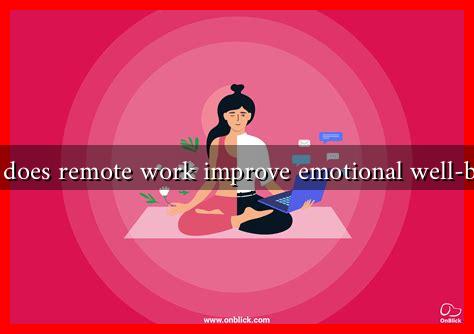-
Table of Contents
How Does Remote Work Improve Emotional Well-Being?
In recent years, remote work has transitioned from a niche arrangement to a mainstream practice, especially accelerated by the COVID-19 pandemic. As organizations adapt to this new normal, many employees are discovering that working from home can significantly enhance their emotional well-being. This article explores the various ways remote work contributes to improved mental health and emotional stability.
The Flexibility Factor
One of the most significant advantages of remote work is the flexibility it offers. Employees can create their schedules, allowing them to balance work and personal life more effectively. This flexibility can lead to several emotional benefits:
- Reduced Stress: The ability to manage work hours can help employees avoid the stress of commuting and rigid office hours.
- Increased Autonomy: Having control over one’s work environment fosters a sense of independence, which can boost self-esteem and job satisfaction.
- Better Work-Life Balance: Employees can allocate time for family, hobbies, and self-care, leading to a more fulfilling life outside of work.
Enhanced Focus and Productivity
Remote work often allows for a more personalized and distraction-free environment. Many employees report that they can concentrate better at home than in a bustling office. This enhanced focus can lead to:
- Increased Job Satisfaction: Completing tasks efficiently can lead to a sense of accomplishment, which positively impacts emotional well-being.
- Lower Anxiety Levels: A quieter workspace can reduce feelings of overwhelm and anxiety, allowing employees to engage more deeply with their work.
- Opportunities for Deep Work: Remote work enables employees to enter a state of flow, where they can work on complex tasks without interruptions.
Social Connections and Community Building
While remote work can sometimes lead to feelings of isolation, it also opens up new avenues for social interaction. Many companies have adopted virtual team-building activities and regular check-ins to maintain a sense of community. The emotional benefits include:
- Stronger Relationships: Remote work encourages employees to connect on a personal level, fostering deeper relationships with colleagues.
- Support Networks: Virtual platforms allow employees to share experiences and support each other, which can be crucial for mental health.
- Increased Inclusivity: Remote work can create opportunities for individuals who may have felt marginalized in traditional office settings.
Access to Mental Health Resources
Many organizations are recognizing the importance of mental health and are providing resources to support their remote workforce. This includes:
- Online Counseling Services: Companies are increasingly offering access to mental health professionals through teletherapy.
- Wellness Programs: Initiatives such as mindfulness training, yoga classes, and stress management workshops are becoming more common.
- Flexible Time Off: Organizations are implementing policies that allow employees to take mental health days without stigma.
Case Studies and Statistics
Research supports the notion that remote work can enhance emotional well-being. A study by Buffer in 2021 found that 32% of remote workers reported improved mental health, while 29% cited a better work-life balance as a primary benefit. Additionally, a survey by Owl Labs revealed that remote workers are 22% happier than their in-office counterparts.
Companies like GitLab and Zapier have embraced remote work culture and have reported higher employee satisfaction and retention rates. These organizations prioritize mental health and well-being, demonstrating that a supportive remote work environment can lead to positive outcomes.
Conclusion
Remote work presents a unique opportunity to enhance emotional well-being through flexibility, increased focus, social connections, and access to mental health resources. As organizations continue to adapt to this evolving landscape, it is crucial to prioritize the emotional health of employees. By fostering a supportive remote work environment, companies can not only improve employee satisfaction but also drive productivity and innovation. The future of work is not just about where we work, but how we can create a healthier, more balanced life in the process.
For more insights on remote work and mental health, you can visit MentalHealth.gov.

